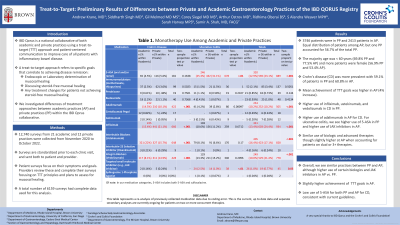Monday Poster Session
Category: IBD
P2208 - Treat-To-Target: Differences Between Private and Academic Gastroenterology Practices of the IBD QORUS Registry
Monday, October 23, 2023
10:30 AM - 4:15 PM PT
Location: Exhibit Hall

Has Audio

Andrew Krane, MD
Warren Alpert Medical School of Brown University
Providence, RI
Presenting Author(s)
Andrew Krane, MD1, Siddharth Singh, MD2, Gil Melmed, MD, MS3, Corey A. Siegel, MD, MS4, Arthur H. Ostrov, MD5, Ridhima Oberai, BS6, Alandra Weaver, MPH6, Sarah Harvey, MPS6, Samir A. Shah, MD7
1Warren Alpert Medical School of Brown University, Providence, RI; 2University of California, San Diego, San Diego, CA; 3Center for Inflammatory Bowel Diseases, Cedars-Sinai Medical Center, Los Angeles, CA; 4Dartmouth-Hitchcock Inflammatory Bowel Disease Center, Dartmouth-Hitchcock Medical Center, Lebanon, NH; 5Saratoga Schenectady Gastroenterology Associates, Burnt Hills, NY; 6Crohn's and Colitis Foundation, New York, NY; 7Gastroenterology Associates, Inc., Providence, RI
Introduction: IBD Qorus is a national collaborative of both academic and private practices using a treat-to-target (TTT) approach and patient-centered communication to improve care of all patients with inflammatory bowel disease. A treat-to-target approach refers to specific goals that correlate to achieving disease remission. Previous studies reported wide variations in utilization of advanced therapies geographically and by practice type. We investigated differences of treatment approaches between academic and private practices within the IBD Qorus collaborative.
Methods: 12,740 surveys from 21 academic and 12 private practices were collected from November 2020 to October 2022. Surveys are standardized prior to each clinic visit, and sent both to patient and provider. Patient surveys focus on their symptoms and goals. Providers review these and complete their surveys focusing on TTT principles and plans to assess for mucosal healing. Deidentified data from the surveys is uploaded to a central database. A total number of 6159 surveys had complete data used for this analysis.
Results: There were 3746 patients in private and 2413 in academic practices. Patients were equally distributed among academic practices, but one private practice accounted for 56.7% of the total private population. The majority age was < 60 years (69.8% private and 77.5% academic) and more patients were female (56.9% private and 53.4% academic). Crohn’s disease was more prevalent with 59.1% of patients in private and 60.8% in academic practices. Differences were seen among use of 5-ASA, biologics, and advanced therapies between both practices (Table 1). Mean achievement of TTT goals was higher in academic practices (4% increase).
Discussion: In this analysis, we observed some differences in medications use among academic and private centers. Notably, we see higher use of 5-ASA, Infliximab, and Vedolizumab in Crohn’s Disease and all patients in private practices. Academic centers use more Adalimumab and Ustekinumab in Crohn’s Disease. For ulcerative colitis, we see higher use of 5-ASA in private practice and higher use of biologics, and advanced therapies in academic centers. For all patients, we note similar use of biologic and advanced therapies though slightly higher at academic centers. This data may be affected by the disease severity, varying numbers from sites, availability of infusion services, and method of recruitment. Further analysis of these differences is warranted.
Disclosures:
Andrew Krane, MD1, Siddharth Singh, MD2, Gil Melmed, MD, MS3, Corey A. Siegel, MD, MS4, Arthur H. Ostrov, MD5, Ridhima Oberai, BS6, Alandra Weaver, MPH6, Sarah Harvey, MPS6, Samir A. Shah, MD7. P2208 - Treat-To-Target: Differences Between Private and Academic Gastroenterology Practices of the IBD QORUS Registry, ACG 2023 Annual Scientific Meeting Abstracts. Vancouver, BC, Canada: American College of Gastroenterology.
1Warren Alpert Medical School of Brown University, Providence, RI; 2University of California, San Diego, San Diego, CA; 3Center for Inflammatory Bowel Diseases, Cedars-Sinai Medical Center, Los Angeles, CA; 4Dartmouth-Hitchcock Inflammatory Bowel Disease Center, Dartmouth-Hitchcock Medical Center, Lebanon, NH; 5Saratoga Schenectady Gastroenterology Associates, Burnt Hills, NY; 6Crohn's and Colitis Foundation, New York, NY; 7Gastroenterology Associates, Inc., Providence, RI
Introduction: IBD Qorus is a national collaborative of both academic and private practices using a treat-to-target (TTT) approach and patient-centered communication to improve care of all patients with inflammatory bowel disease. A treat-to-target approach refers to specific goals that correlate to achieving disease remission. Previous studies reported wide variations in utilization of advanced therapies geographically and by practice type. We investigated differences of treatment approaches between academic and private practices within the IBD Qorus collaborative.
Methods: 12,740 surveys from 21 academic and 12 private practices were collected from November 2020 to October 2022. Surveys are standardized prior to each clinic visit, and sent both to patient and provider. Patient surveys focus on their symptoms and goals. Providers review these and complete their surveys focusing on TTT principles and plans to assess for mucosal healing. Deidentified data from the surveys is uploaded to a central database. A total number of 6159 surveys had complete data used for this analysis.
Results: There were 3746 patients in private and 2413 in academic practices. Patients were equally distributed among academic practices, but one private practice accounted for 56.7% of the total private population. The majority age was < 60 years (69.8% private and 77.5% academic) and more patients were female (56.9% private and 53.4% academic). Crohn’s disease was more prevalent with 59.1% of patients in private and 60.8% in academic practices. Differences were seen among use of 5-ASA, biologics, and advanced therapies between both practices (Table 1). Mean achievement of TTT goals was higher in academic practices (4% increase).
Discussion: In this analysis, we observed some differences in medications use among academic and private centers. Notably, we see higher use of 5-ASA, Infliximab, and Vedolizumab in Crohn’s Disease and all patients in private practices. Academic centers use more Adalimumab and Ustekinumab in Crohn’s Disease. For ulcerative colitis, we see higher use of 5-ASA in private practice and higher use of biologics, and advanced therapies in academic centers. For all patients, we note similar use of biologic and advanced therapies though slightly higher at academic centers. This data may be affected by the disease severity, varying numbers from sites, availability of infusion services, and method of recruitment. Further analysis of these differences is warranted.
Disclosures:
Andrew Krane indicated no relevant financial relationships.
Siddharth Singh: Pfizer – Advisor or Review Panel Member, Grant/Research Support.
Gil Melmed: AbbVie – Consultant. Amgen – Consultant. Arena – Consultant. BI – Consultant. BMS – Consultant. Dieta – Consultant, Owner/Ownership Interest. Eli Lilly – Employee. Ferring – Consultant. Fresenius Kabi – Consultant. Genetech – Consultant. Gilead – Consultant. Janseen – Consultant. Oshi – Consultant, Owner/Ownership Interest. Pfizer – Consultant, Grant/Research Support. Prometheus Labs – Consultant. Samsung Bioepis – Consultant. Takeda – Consultant. Techlab – Consultant. Viatris – Consultant.
Corey Siegel: Abbvie – Advisory Committee/Board Member, Consultant, Grant/Research Support, Speakers Bureau. BMS – Advisory Committee/Board Member, Consultant. Eli Lilly – Advisory Committee/Board Member, Consultant. Fresnius – Advisory Committee/Board Member, Consultant. Janssen – Advisory Committee/Board Member, Consultant, Grant/Research Support, Consultant/advisory board, speaker for CME activities. Napo Pharmaceuticals – Advisory Committee/Board Member, Consultant. Pfizer – Advisory Committee/Board Member, Consultant, Grant/Research Support, speaker for CME activities. Prometheus Biosciences – Advisory Committee/Board Member, Consultant. Takeda – Advisory Committee/Board Member, Consultant, Grant/Research Support, Speakers Bureau.
Arthur Ostrov indicated no relevant financial relationships.
Ridhima Oberai indicated no relevant financial relationships.
Alandra Weaver indicated no relevant financial relationships.
Sarah Harvey indicated no relevant financial relationships.
Samir Shah indicated no relevant financial relationships.
Andrew Krane, MD1, Siddharth Singh, MD2, Gil Melmed, MD, MS3, Corey A. Siegel, MD, MS4, Arthur H. Ostrov, MD5, Ridhima Oberai, BS6, Alandra Weaver, MPH6, Sarah Harvey, MPS6, Samir A. Shah, MD7. P2208 - Treat-To-Target: Differences Between Private and Academic Gastroenterology Practices of the IBD QORUS Registry, ACG 2023 Annual Scientific Meeting Abstracts. Vancouver, BC, Canada: American College of Gastroenterology.
